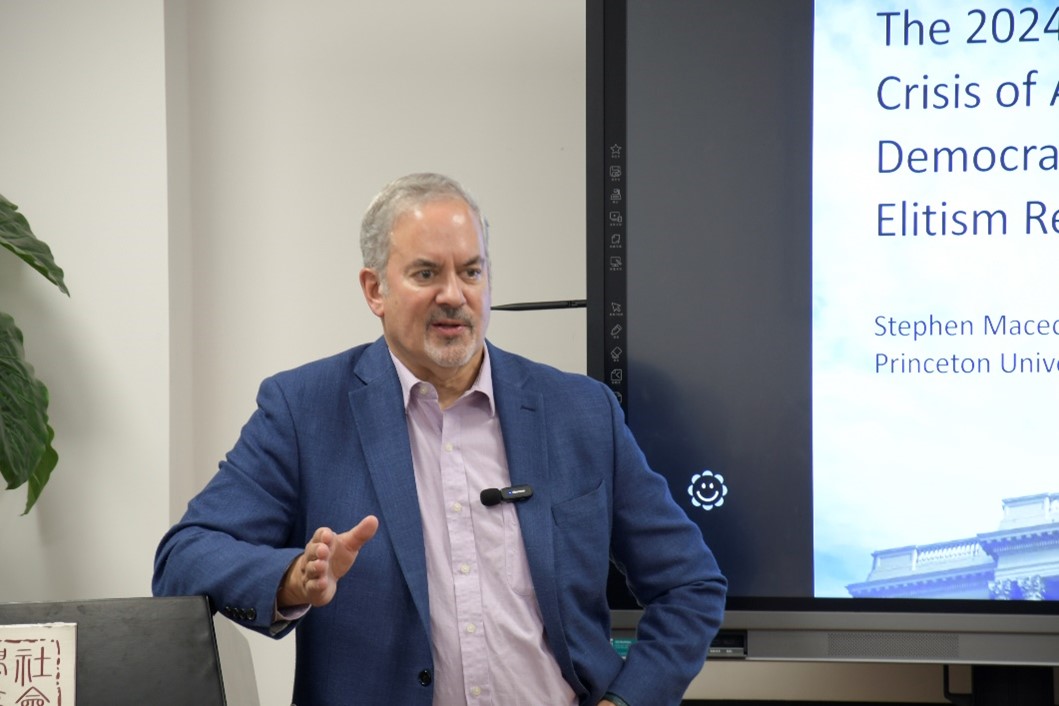The "World Social Science Advanced Lecture" (No. 79), organized by the Fudan Institute for Advanced Study in Social Sciences (Fudan IAS) and Contemporary China Research Center at Fudan University, was held on Oct 11, 2024, at Fudan University. Stephen Macedo, Laurance S. Rockefeller Professor of Politics and the University Center for Human Values at Princeton University, member of the American Academy of Arts and Sciences, member of American Academy of Arts and Letters and past-President of the American Society for Political and Legal Philosophy, gave a lecture entitled The 2024 Election and the Crisis of American Democracy: Populism and Elitism Reconsidered. The lecture attracted more than 100 participants.
Prof. Sujian Guo, Dean and Distinguished Professor of Fudan IAS, chaired the lecture. Prof. Guo gave a warm welcome to Prof. Macedo and introduced his major publications and research areas to the participants. Prof. Macedo expressed his gratitude for the invitation from Fudan IAS and then began the sharing.

Prof. Macedo started the discussion on the upcoming 2024 US presidential election by stating that while the result of the 2024 election is not yet known, some issues and their consequences are clear. Firstly, party control of the US President, the House and Senate, is in play, and Prof. Macedo stated that not since 2000 has there been such a fierce competition for control of the three at the same time. On the other hand, the control from the two parties of the popular vote, the Electoral College, and the two institutions of the national legislature (the House and the Senate) is likely to be close. The distribution of party power in the two chambers has been very close, and the 2024 elections are unlikely to significantly alter this balance, as there are very few competitive seats.
Prof. Macedo went on to point out that in this highly competitive environment, no matter who wins, there are three important possible consequences: first, the risk of a controversial outcome is high. Second, the party power struggles in Congress continue unabated, and the third possible consequence is that it will be difficult for the President to exercise legislative leadership regardless of which party wins, due to the fact that the President needs bipartisan support to get bills through Congress, but today's electoral environment makes it difficult for the President to get that support. Prof. Macedo noted that no matter which party wins, a landslide is unlikely in 2024, and that the situation in Washington will remain competitive and conflictual, which in turn means that party power struggles will continue after the election, but he also emphasized that the President of the United States still has a lot of power.
Prof. Macedo then shared three issues that are central to the 2024 US presidential election. The first one is immigration, and he focused on the relationship between immigration and populism. Regarding the second issue, political polarization, he noted that one of the central features of American politics is affective polarization, which is the growing hostility towards members of opposing political parties. The final issue is US policy on the epidemic, and Prof. Macedo focused on answering the questions of what happened and how it fared in both Democratic and Republican states.
After Prof Macedo's speech, Prof. Guo chaired a Q&A session, in which participants enthusiastically asked questions on the content of the lecture, and Prof. Macedo responded to them one by one and said that more exchanges would be welcome. Finally, Prof. Guo expressed his gratitude to Prof. for his informative and wonderful sharing, and the lecture ended with a warm applause.
